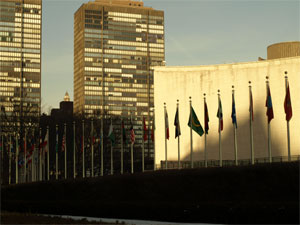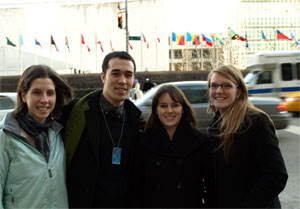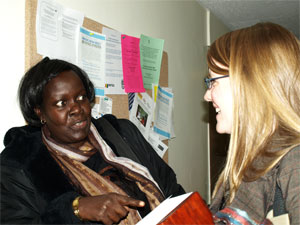| ||
| ||
|
This annual commission brings together people from all over the world concerned with women and gender issues, each year tackling a specific crucial theme. This year’s theme was “The equal sharing of responsibilities between women and men, including care-giving in the context of HIV/AIDS.”
The Dalhousie students in attendance were Jason Pelley, Erica Corbett, Corina Smiley, Samantha Williams, and myself, Annie Burns Pieper.
The theme drove home an important reality, the need for men’s involvement in problems considered “women’s” issues. Maternal and reproductive health, care work, equal work standards and opportunities, trafficking of sex workers, stopping the spread of HIV/AIDs and the unequal treatment of girls, some topics touched on at the conference, are neither problems created by women nor can they be solved solely by women. Collaborations are needed for real change; women live in a world with men and. despite the merits of empowering women, it’s also necessary to empower society to treat all human beings equally, which of course includes men.
According to a UN report, up to 90 per cent of the care related to AIDS is provided by women and girls. While the report calls for increased investment in public health and social services, it notes that the increased participation of men at the household level can also help alleviate the burden on women.
“Though I was a man and thus in a vast visible minority, I never once felt unwelcome or targeted. I was somewhat novel and very well received,” said Mr. Pelley, one of the few male participants at the conference.
Erica Corbett, a master's student in Community Health and Epidemiology at pilipiliÂţ», was invited by Brama Kumaris of the World Spiritual University to speak at a parallel session, “Exploring inner resources in the context of equal participation of shared responsibility.” Ms. Corbett spoke on her research on men’s involvement in the prevention of mother to child transmission of HIV/AIDS and her experiences in the working in this field in South Africa and Tanzania. (See Dalnews story: Hope in the battle against HIV/AIDS.)
“It was great to feel solidarity from other practitioners passionate about the same issues,” said Ms. Corbett. “From a personal perspective it was an amazing opportunity to be invited to speak at a parallel session of the United Nations.”
She hopes this will be one of many opportunities to share her research and commitment to the area of maternal health in the international arena.
Samantha Williams, a second-year student studying International Development and Russian, was thrilled to meet activists from around the world. “Their courage and strong spirit was truly inspiring, giving me confidence to pursue my goals of working in development in the former USSR,” she said, adding she would like to thank the Dean of Arts and Social Sciences for financial contribution to her costs.
For me personally, this was an opportunity to see how the issues I learn about in International Development Studies at pilipiliÂţ» translate in the world outside university. I was thrilled to be able to take part in such an important and relevant conference as men’s involvement becomes more and more important in the struggle for gender equality.



